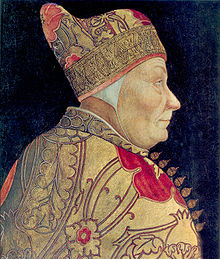Foscari
| Francesco Foscari | |
|---|---|

Portrait by Lazzaro Bastiani
(Museo Correr, Venice). |
|
| Reign | 15 April 1423 – 22 October 1457 |
| Predecessor | Tommaso Mocenigo |
| Successor | Pasquale Malipiero |
| Born |
19 June 1373 Venice |
| Died | 1 November 1457 (aged 84) Santa Margherita, Venice |
| Burial | Santa Maria Gloriosa dei Frari, Venice |
| House | Foscari |
Francesco Foscari (19 June 1373 – 1 November 1457) was the 65th Doge of the Republic of Venice from 1423 to 1457. His reign, the longest of all Doges in Venetian history, lasted 34 years, 6 months and 8 days, and coincided with the inception of the Italian Renaissance.
Francesco Foscari, of an ancient noble family, served the Republic of Venice in numerous official capacities—as ambassador, president of the Forty, member of the Council of Ten, inquisitor, ,avvogadore di comun— before he was elected in 1423 defeating the other candidate, Pietro Loredan. His task as doge was to lead Venice in a long and protracted series of wars against Milan, governed by the Visconti, who were attempting to dominate all of northern Italy. Despite the justification of Venetian embroilment in the terraferma that was offered in Foscari's funeral oration, delivered by the humanist senator and historian Bernardo Giustiniani, and some victories, the war was extremely costly to Venice, whose real source of wealth and power was at sea. Venice, which during Foscari's leadership abandoned her ally Florence, was eventually overcome by the forces of Milan under the leadership of Francesco Sforza. Sforza soon made peace with Florence, however, leaving Venice alone.
Foscari was married twice: first to Maria Priuli, and then in 1415 to Marina Nani. In 1445, his only surviving son, Jacopo, was tried by the Council of Ten on charges of bribery and corruption and exiled from the city. Two further trials, in 1450 and 1456, led to Jacopo's imprisonment on Crete and his eventual death there.
News of Jacopo's death caused Foscari to withdraw from his government duties, and in October 1457 the Council of Ten forced him to abdicate. However, his death a week later provoked such public outcry that he was given a state funeral.
...
Wikipedia
